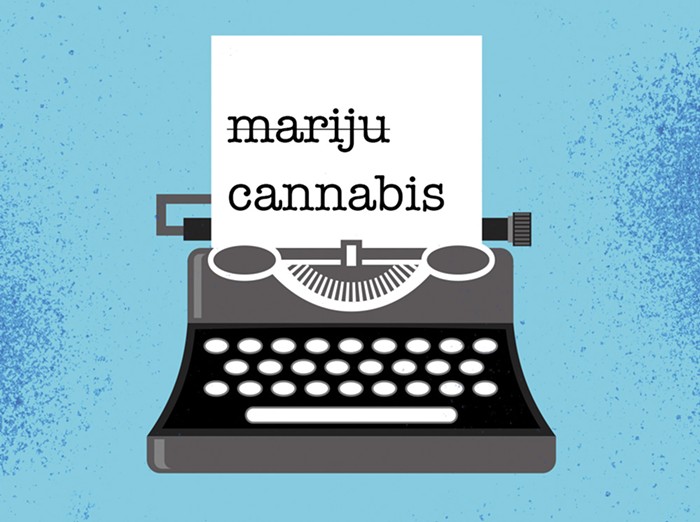Why do we call marijuana marijuana? Growing up, I assumed that "marijuana" was the original Latin name for the plant I discuss every week in this column. But that's not the case.
Cannabis is its actual name. Cannabis is the genus that contains the three psychoactive plants we love so well: Cannabis sativa, Cannabis indica, and their stubby cousin Cannabis ruderalis. However, cannabis is far more commonly referred to as marijuana. Why?
The term "marijuana" came to the United States via Mexico. How it came to Mexico is still a mystery. Scholar Alan Piper made a valiant attempt at its etymology in a 2005 issue of the academic journal Sino-Platonic Papers, but came to the conclusion that it could have come from China, or maybe Spain, or maybe it was already in North America.
"Of all the multifarious terms associated with the cannabis plant," he wrote, "marihuana is one of the most universally recognized and used in the English-speaking world, yet its origins remain deeply obscure." He goes on to say, "The word marijuana, together with the use of herbal cannabis as an intoxicant, is consistently identified as coming into the USA from Mexico, being brought there by migrant workers."
That key phrase—"the use of herbal cannabis as an intoxicant"—could explain why we still call cannabis marijuana today.
In 1930, Harry Anslinger, the head of the brand-new Federal Bureau of Narcotics, was unsatisfied with regulating only cocaine and opium. When he went in front of a congressional panel in 1937 to push his pot prohibition bill, he said, "We seem to have adopted the Mexican terminology, and we call it marihuana."
While he sounds all innocent there, like he just picked up the word from who knows where, many surmise that he was actively using the term to focus the discussion on recreational use. His terminology distanced the plant as much as possible from its common medical and industrial uses, where it was more often referred to as cannabis or hemp. Using "marijuana," most commonly associated with recreational use among poor Mexican immigrants, was a sneaky bit of branding for the bill he wanted passed.
Dr. William C. Woodward, legislative counsel of the American Medical Association, showed up to the same 1937 hearing to protest Anslinger's feigned semantic innocence, accusing him of switching the name to fool groups that would have otherwise been opposed to the bill.
"I use the word 'cannabis' in preference to the word 'marihuana,' because cannabis is the correct term for describing the plant and its products," Woodward said. "It was the use of the term 'marihuana' rather than the use of the term 'cannabis' or the use of the term 'Indian hemp' that was responsible, as you realized, probably, a day or two ago, for the failure of the dealers in Indian hempseed to connect up this bill with their business until rather late in the day."
As an example of the racial dimension of Anslinger's animus toward cannabis, here's one of his quotes on the subject: "There are 100,000 total marijuana smokers in the US, and most are Negroes, Hispanics, Filipinos, and entertainers. Their satanic music, jazz, and swing, result from marijuana use," he said. "This marijuana causes white women to seek sexual relations with Negroes, entertainers, and any others."
William Randolph Hearst was also happy to lend his newspaper empire to the cause of pot prohibition, printing such inflammatory bullshit in nationally syndicated columns as: "Was it marijuana, the new Mexican drug, that nerved the murderous arm of Clara Phillips when she hammered out her victim's life in Los Angeles?... Three-fourths of the crimes of violence in this country today are committed by dope slaves—that is a matter of cold record."
This use of the term represents a marked linguistic shift. As NPR reported in 2013, "Throughout the 19th century, news reports and medical journal articles almost always use the plant's formal name, cannabis."
No matter how you slice it, the rise of the term marijuana is suspiciously contemporaneous with its popularity in racist screeds. To that end, I'm going to stop using the word "marijuana" in this column, except in proper names, quotations, or where it is part of the seemingly inseparable alliterative pairing "medical marijuana" (after all, "medical marijuana" has specific regulatory policy attached to it).
While the word doesn't carry the same racist connotations it once did, I see no reason to use it when "cannabis" or "pot" or "weed" work fine. And I'm not alone.
Harborside Health Center, one of California's largest and most influential dispensaries, has a page on its website devoted to the issue.
"The word 'marijuana' or 'marihuana' is an emotional, pejorative term that has played a key role in creating the negative stigma that still tragically clings to this holistic, herbal medicine," it reads. "Most cannabis users recognize the 'M word' as offensive, once they learn its history. We prefer to use the word cannabis, because it is a respectful, scientific term that encompasses all the many different uses of the plant."
I asked an expert on the subject—someone who runs a socially conscious (and sadly illegal) cannabis delivery service—what they thought. "We are very vocally against that word and fully support whatever action you choose to take against its use," they said. "It's 100 percent racist terminology."



















